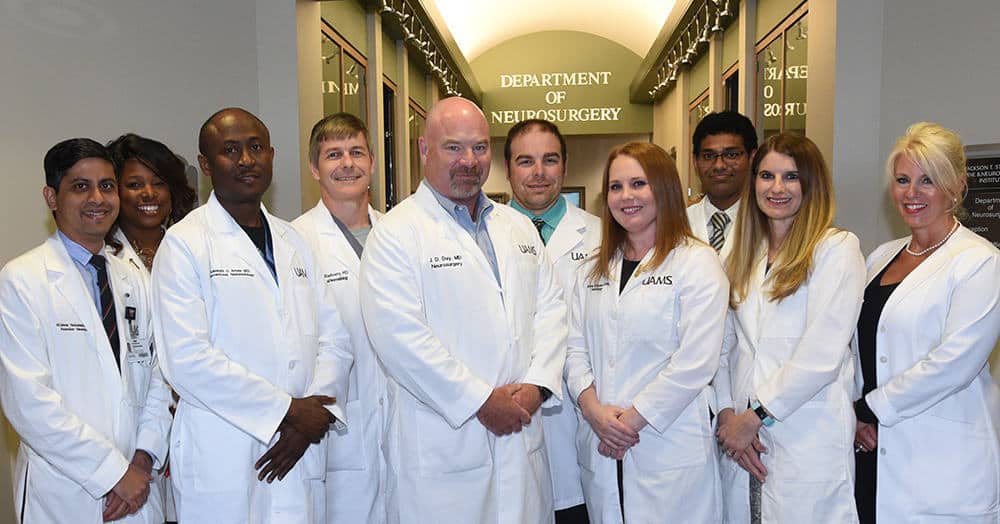UAMS Medical Center Certified as First and Only Comprehensive Stroke Center in Arkansas
| July 13, 2018 | UAMS Medical Center has become the first and only health care provider in Arkansas to be certified as a Comprehensive Stroke Center by The Joint Commission.
The Joint Commission is an independent, not-for-profit organization that evaluates and accredits more than 20,000 health care organizations and programs in the United States.
“Achieving the standard of care required by The Joint Commission to be certified as a Comprehensive Stroke Center means a stroke patient at UAMS has a better chance here than anywhere else in the state of not only surviving but leaving our care with the best possible health outcome,” said Martin Radvany, M.D., a professor and chief of Interventional Neuroradiology at the University of Arkansas for Medical Sciences (UAMS).
According to the Joint Commission, the certification is the most demanding accreditation and is designed for those hospitals that have the specific abilities to receive and treat the most complex stroke cases. It also means certified hospitals can provide endovascular procedures and post-procedural care and has an Emergency Department with a dedicated stroke-focused program.
“Achieving Comprehensive Stroke Center designation places UAMS among the top stroke centers in the country that have the resources and highly skilled health care teams with advanced training to handle the most complex stroke cases,” said UAMS Chancellor Cam Patterson, M.D., MBA. “I am extremely proud of our medical center and our stroke team for their dedication to achieving this designation to provide Arkansans with access to the most advanced stroke care possible.”
“This is truly an extraordinary accomplishment that will save lives,” Patterson said.
In July 2017, UAMS formed a team to work on getting the Medical Center ready for the Comprehensive Stroke Certification. A gap analysis was performed to show what points of care needed to be addressed for certification. Multiple aspects of the stroke program had to be documented as well.
An application for the certification was sent to The Joint Commission in August. In May, two commission surveyors conducted the comprehensive survey over the course of two days. They toured all areas that cared for stroke patients. In addition, the surveyors reviewed files and chart reviews and interviewed staff and patients.
“This effort elevated the requirements of 24/7 coverage for all stroke providers at UAMS,” said Matthew Mitchell, director of the UAMS Stroke Program. “It took everyone working in the program using all their experience and energy to achieve the highest possible certification. It was the culmination of years of work. We will keep giving our all to maintain this standard and to provide the best care for the state’s stroke patients. Dr. Radvany, Dr. Day and I along with everyone at UAMS couldn’t be prouder of our stroke team.”
J.D. Day, M.D., is the chairman of the UAMS College of Medicine’s Department of Neurosurgery and director of the neurosciences clinical program that includes the stroke service and multidisciplinary team leaders.
To be a comprehensive stroke center, a hospital or clinic must be able to provide 24/7 care for patients suffering from a stroke and any cerebrovascular disorder, including ruptured brain aneurysms and bleeding into and around the brain. The Joint Commission requires the provider hospital or clinic to have the following available to do that: an acute stroke team, neurointensive care unit beds for complex stroke patients, the ability to meet the concurrent needs of two complex stroke patients, and have neurosurgical services. A center must be able to offer comprehensive diagnostic services; on-site coverage by a neurospecialist for its neurointensive care unit; participate in patient-centered research that is approved by an institutional review board; and track, monitor and report performance measures.
